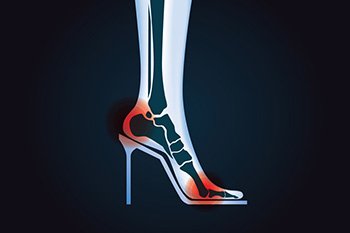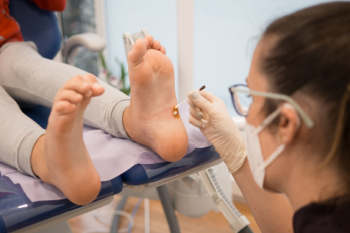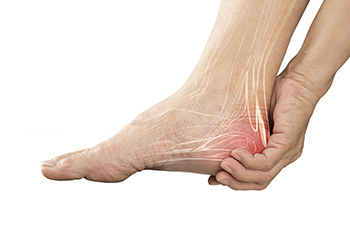
Please contact our office to schedule an appointment or for more information.

Women's footwear choices, whether flat, mid-heel, or high-heeled, can significantly influence foot health and overall well-being. Flat shoes, while often considered comfortable and practical, may lack proper arch support, leading to issues such as fallen arches or plantar fasciitis. Mid-heel shoes provide a compromise between style and comfort, offering a modest lift without placing excessive strain on the feet and calves. However, prolonged wear of mid-heel shoes can still contribute to foot pain and discomfort, particularly if the shoes lack adequate cushioning or support. On the other hand, high-heeled shoes, while stylish and elongating, can cause a myriad of foot problems, including bunions, hammertoes, and metatarsalgia, due to the increased pressure and instability they place on the feet and ankles. If any of the above foot conditions have developed from wearing high heels, it is suggested that you consult a podiatrist who can guide you toward effective treatment strategies.
High heels have a history of causing foot and ankle problems. If you have any concerns about your feet or ankles, contact Dr. Thomas Tran from Southwestern Foot & Ankle Associates, P.C.. Our doctor can provide the care you need to keep you pain-free and on your feet.
Effects of High Heels on the Feet
High heels are popular shoes among women because of their many styles and societal appeal. Despite this, high heels can still cause many health problems if worn too frequently.
Which Parts of My Body Will Be Affected by High Heels?
What Kinds of Foot Problems Can Develop from Wearing High Heels?
How Can I Still Wear High Heels and Maintain Foot Health?
If you want to wear high heeled shoes, make sure that you are not wearing them every day, as this will help prevent long term physical problems. Try wearing thicker heels as opposed to stilettos to distribute weight more evenly across the feet. Always make sure you are wearing the proper shoes for the right occasion, such as sneakers for exercising. If you walk to work, try carrying your heels with you and changing into them once you arrive at work. Adding inserts to your heels can help cushion your feet and absorb shock. Full foot inserts or metatarsal pads are available.
If you have any questions please feel free to contact our office located in Frisco, TX . We offer the newest diagnostic and treatment technologies for all your foot and ankle needs.

Viral and plantar warts are two foot conditions caused by the human papilloma-virus, abbreviated HPV. Viral warts, also known as common warts, typically appear as small, raised bumps with a rough texture on the surface of the skin. These warts can develop anywhere on the foot but are commonly found on pressure points like the heels or balls of the feet. Conversely, plantar warts specifically affect the soles of the feet, often appearing flat with a thickened callus-like texture and tiny black dots, known as wart seeds, within them. Both types of warts are contagious and can spread through direct contact or by walking barefoot in public areas like swimming pools or gym locker rooms. While viral and plantar warts are generally harmless and may resolve on their own over time, some cases may require specialized treatment to alleviate discomfort and prevent further spread. If you have developed warts on your foot, it is suggested that you visit a podiatrist who can effectively treat them.
Plantar warts can be very uncomfortable. If you need your feet checked, contact Dr. Thomas Tran from Southwestern Foot & Ankle Associates, P.C.. Our doctor will assist you with all of your foot and ankle needs.
About Plantar Warts
Plantar warts are the result of HPV, or human papillomavirus, getting into open wounds on the feet. They are mostly found on the heels or balls of the feet.
While plantar warts are generally harmless, those experiencing excessive pain or those suffering from diabetes or a compromised immune system require immediate medical care. Plantar warts are easily diagnosed, usually through scraping off a bit of rough skin or by getting a biopsy.
Symptoms
Treatment
To help prevent developing plantar warts, avoid walking barefoot over abrasive surfaces that can cause cuts or wounds for HPV to get into. Avoiding direct contact with other warts, as well as not picking or rubbing existing warts, can help prevent the further spread of plantar warts. However, if you think you have developed plantar warts, speak to your podiatrist. He or she can diagnose the warts on your feet and recommend the appropriate treatment options.
If you have any questions please feel free to contact our office located in Frisco, TX . We offer the newest diagnostic and treatment technologies for all your foot and ankle needs.

Heel pain can stem from various underlying causes, impacting the daily activities and quality of life of people of all ages. One common reason is plantar fasciitis, which is the inflammation of the tissue connecting the heel bone to the toes. This condition often causes sharp pain in the bottom of the heel, particularly upon standing or walking after periods of rest. Achilles tendonitis, another frequent cause of heel pain, involves inflammation of the Achilles tendon at the back of the heel, typically the result of overuse or repetitive stress. Other factors contributing to heel pain include heel spurs, stress fractures, and nerve compression. Symptoms may range from mild discomfort to severe pain and may worsen with activity. Proper diagnosis by a podiatrist is critical for effective treatment and management strategies tailored to address the underlying cause of heel pain. If you have developed heel pain, it is suggested that you consult a podiatrist who can offer you a tailored treatment plan.
Many people suffer from bouts of heel pain. For more information, contact Dr. Thomas Tran of Southwestern Foot & Ankle Associates, P.C.. Our doctor can provide the care you need to keep you pain-free and on your feet.
Causes of Heel Pain
Heel pain is often associated with plantar fasciitis. The plantar fascia is a band of tissues that extends along the bottom of the foot. A rip or tear in this ligament can cause inflammation of the tissue.
Achilles tendonitis is another cause of heel pain. Inflammation of the Achilles tendon will cause pain from fractures and muscle tearing. Lack of flexibility is also another symptom.
Heel spurs are another cause of pain. When the tissues of the plantar fascia undergo a great deal of stress, it can lead to ligament separation from the heel bone, causing heel spurs.
Why Might Heel Pain Occur?
Treatments
Heel pain should be treated as soon as possible for immediate results. Keeping your feet in a stress-free environment will help. If you suffer from Achilles tendonitis or plantar fasciitis, applying ice will reduce the swelling. Stretching before an exercise like running will help the muscles. Using all these tips will help make heel pain a condition of the past.
If you have any questions please contact our office located in Frisco, TX . We offer the newest diagnostic and treatment technologies for all your foot and ankle needs.
Copyright © Southwestern Foot and Ankle Associates, P.C. | Site Map | Nondiscimination | Design by: Podiatry Content Connection